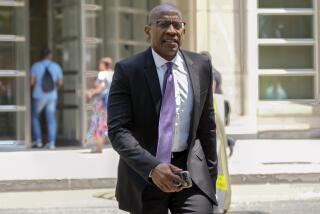Motion Picture Bootlegger Convicted
- Share via
Johnny Ray Gasca, dubbed Hollywood’s prince of piracy, was found guilty on seven criminal counts Wednesday by a Los Angeles jury, the first victory scored by federal prosecutors in a major movie bootlegging case.
Gasca, 35, was the first person to face federal charges for using a camcorder to tape a film inside a theater. Largely because of Gasca, Hollywood studios cracked down on security at pre-release film screenings. In addition, the Motion Picture Assn. of America held Gasca up as an example in lobbying successfully this year for a federal law making the taping of movies in theaters a felony.
The U.S. District Court jury found Gasca guilty of three misdemeanor counts for using a camcorder to tape “Anger Management,” “8 Mile” and “The Core” in 2002 and 2003.
He also was found guilty of four felony charges: witness retaliation, interstate communication of a threat, possession of false identification and fleeing the custody of his lawyer. The last charge stemmed from Gasca giving his lawyer the slip at a West Los Angeles drugstore in January 2004 as he was about to go on trial. Gasca was on the lam for more than a year before U.S. marshals arrested him in April at a Kissimmee, Fla., hotel. In his room was recording equipment, DVDs and video cameras.
Gasca, who faces a maximum of 33 years in prison, is scheduled to be sentenced Sept. 16 by U.S. District Judge Dean Pregerson.
A subdued Gasca, who served as his own lawyer, showed no emotion and offered no comment as the verdicts were read, a contrast to his colorful courtroom antics during the trial. Gasca maintained his innocence throughout, arguing that the taping wasn’t illegal when he did it and that he was just a collector of old kung fu movies.
But Gasca’s personal journal, where he chronicled his Hollywood adventures, turned out to be the government’s most valuable weapon. In his diary, he boasted that he was making as much as $4,000 a week illegally taping movies.
In a deep voice with a thick Bronx accent, Gasca told the jury that the journal was a work of fiction written to impress girls.
“And I gotta tell you,” he told the 12-member jury, “it worked.”
Assistant U.S. Atty. Elena Duarte, lead prosecutor for the case, said she was pleased with the verdict. MPAA President Dan Glickman also heralded it.
“Gasca, who posed as an employee of the MPAA to get into screenings, threatened people and boasted about his illegal camcording adventures, was brought to justice today,” Glickman said in a statement.
Although Gasca was just one player in a problem that studios say costs the industry $3.5 billion a year, anti-piracy experts maintained that few could match his talent for obtaining high-quality copies for duplication and downloading.
Gasca’s troubles with the law date back to at least 1986, when he was convicted of grand larceny and possession of stolen property. In 1992, he was convicted of attempted murder and served a prison term in New York. According to the court file, he shot a friend during an argument over money.
Gasca’s latest legal troubles began in September 2002 when he was caught in the act of taping by a theater employee at a Paramount Pictures screening of “The Core.” He was arrested by Burbank police and charged with misdemeanor burglary, according to the court file. After being released on bond, he was caught again a month later at a screening of the Eminem movie “8 Mile” when a studio executive noticed “glowing green light” surrounding him.
In January 2003, Gasca was nabbed at a Thousand Oaks theater while taping a Revolution Studios preview of “Anger Management.” Prosecutors during the trial showed a tape of Gasca and two accomplices sitting in the front row taping the Adam Sandler comedy.
On the tape, intended to record audience reaction, Gasca was seen looking nervously to his sides and down at his belt while the movie played. Studio officials in a back room noticed Gasca’s behavior as they watched the crowd being filmed, and confronted him.
After the FBI confiscated filming equipment from Gasca’s Hollywood apartment, witnesses from the MPAA testified, he threatened to send out 20 unreleased movies over the Internet if they didn’t help him retrieve the gear.
That equipment included a belt camera with a fish-eye lens, several digital camcorders, a remote control device used to crop out the heads of audience members and a remote monitor that allowed him to check the quality of his taping efforts.
A jittery U.S. Postal Service worker testified that Gasca threatened to harm her if she spoke to federal authorities about the mail he was receiving.
In defending himself, Gasca described the government’s lineup of witnesses as “proven liars who lied to your face.”
More to Read
The biggest entertainment stories
Get our big stories about Hollywood, film, television, music, arts, culture and more right in your inbox as soon as they publish.
You may occasionally receive promotional content from the Los Angeles Times.










